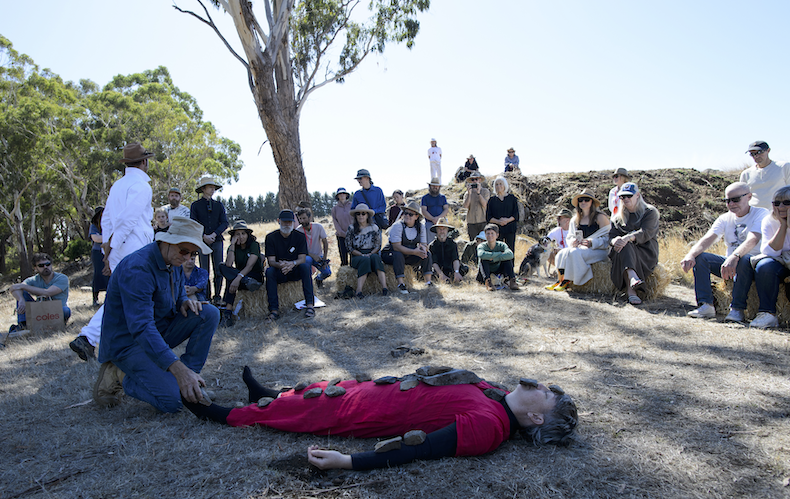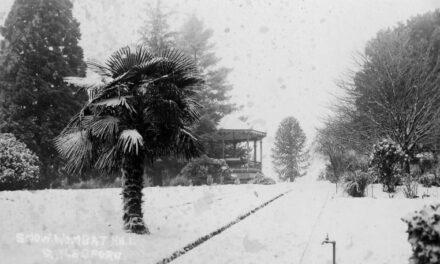Alex Wisser
On March 22, in Glenlyon, Victoria, artists, community and audiences gathered for Radical Fields, a one-day contemporary art festival held entirely in a paddock. Moving art outside the gallery and into the natural landscape is both a bold and humble gesture—embracing the elements, the mess, and the magic of the land itself.
A red circle painted in the grass marked the site of a tractor pull and a dog obedience demonstration. The audience wandered the yellowed field like leaves on still water. The day began with a Welcome to Country by Uncle Rick of the Dja Dja Wurrung, followed by a choir singing in Wiradjuri. A meditative “Zen Walk” set the tone—peaceful, slow, aware.
Artists responded to the environment in diverse, grounded ways. Gav Barbey offered organic materials for visitors to sculpt with. Paul E Mason and Dr Ahmad Tabassi staged a darkly humorous installation on species extinction. Minaal Lawn invited participants to shape clay into round forms, relinquishing artistic control to collective creation. Tas Wansworth taught sandstone carving; Kim Percy staged a photographic performance mimicking subject and photographer.
Delia Allen’s tents housed absurd costumes and cheeky stories gathered from a local school and aged care facility—genuine, unfiltered voices shaped through trust. Hayley West, a death doula, offered a visceral experience of mortality, wrapping visitors in shrouds beside a hearse and grave. I lay down, wrapped and still, feeling the breeze on my skin.
Nearby, Martin John Lee, as Captain Moonlight, stalked the paddock in underwear and a paper beard, handing out Polaroid cameras before vanishing into the bush. Rhae Kendrigan’s Weight of Rock invited audiences to lie down and be covered in stones—an intimate experience of earth’s weight and calm.
To close the day, we gathered in a barn where Lixa Bandt’s Futuristic Farm Spider—a mech-spider made from car parts and a canoe—stood as an apocalyptic totem of rural reinvention. Farmers have long repurposed rusted machines into sculptures; Lixa added a contemporary, speculative layer.
Radical Fields blended country fair with contemporary art—community groups pulling tractors, visitors sculpting clay. As Festival Director Ryan Kennedy put it, the event was “fuelled by the curiosity of blending art with aspects of the everyday.” The result was an experiment without hypothesis—a quiet, contemplative exchange between art, land, and community.
The radical gesture wasn’t in the spectacle, but in the invitation to slow down and notice. In a paddock, far from white-walled galleries, art could simply exist—quiet, embedded, and alive.
Alex Wisser is an artist and creative producer based in mid-western NSW. Co-founder of Cementa Contemporary Arts Festival, his practice explores the role of art in regional contexts through long-term projects like the Kandos School of Cultural Adaptation.





